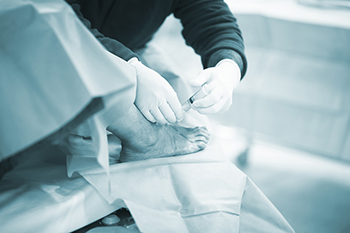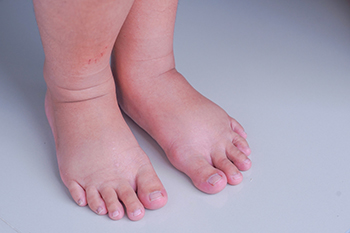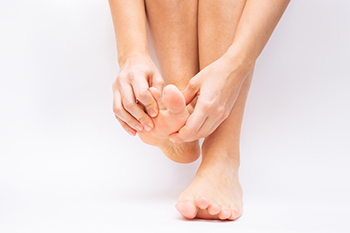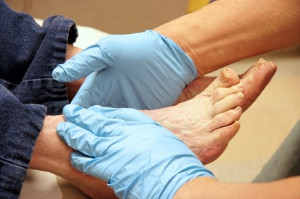January 2024
How Podiatrists Manage Arthritis

Rheumatoid arthritis, or RA, is the most common form of inflammatory arthritis, and it often results in foot-related problems in up to 90 percent of those diagnosed. The foot can be an initial site for RA symptoms, with symptoms that include soreness, swelling, and joint erosion. A podiatrist can identify, diagnose, and treat these foot-related challenges, with an aim to alleviate pain, enhance function, and protect overall foot health. Their palliative foot care includes addressing distorted or altered nails, hard skin, calluses, and corns. A podiatrist also specializes in wound management, offering timely interventions for wounds and ulcers on the feet as they develop. Custom orthotics, ranging from soft cushions to firmer devices, can improve foot alignment and function. A podiatrist can contribute to joint protection, manage inflamed joints, suggest appropriate exercises, and provide insights into surgical options when necessary. Their comprehensive care extends beyond immediate foot concerns, aiming to enhance overall foot health and contribute to the well-being of those navigating the challenges of rheumatoid arthritis. For more information about managing foot problems associated with RA, it is suggested that you include a podiatrist as a permanent member of your medical team.
If you are dealing with pain in your feet and ankles, you may want to seek help from a podiatrist. Feel free to contact one of our podiatrists from Grobowski Foot & Ankle. our doctors can provide the care you need to keep you pain-free and on your feet.
What Is a Podiatrist?
A podiatrist is a doctor of podiatric medicine who diagnoses and treats conditions of the foot, ankle, and related structures of the leg. Your podiatrist may specialize in a certain field such as sports medicine, wound care, pediatrics, and diabetic care. Podiatrists have the ability to become board certified through training, clinical experience, and then taking an exam.
What Do Podiatrists Do?
On a daily basis, a podiatrist may perform the following activities:
- Diagnose foot ailments such as ulcers, tumors, fractures, etc.
- Use innovative methods to treat conditions
- Use corrective orthotics, casts, and strappings to correct deformities
- Correct walking patterns and balance
- Provide individual consultations to patients
It is very important that you take care of your feet. It’s easy to take having healthy feet for granted, however foot problems tend to be among the most common health conditions. Podiatrists can help diagnose and treat a variety of feet related conditions, so it is crucial that you visit one if you need assistance.
If you have any questions please feel free to contact one of our offices located in Bellevue, Seattle, and Issaquah, WA, . We offer the newest diagnostic and treatment technologies for all your foot and ankle needs.
Lymphoedema and Swelling of the Feet

Lymphoedema is a condition where the legs or feet swell due to fluid buildup because the body's lymphatic system, which functions similarly to veins, is struggling to remove it. This swelling is called edema and can happen when you do not move enough, such as after sitting for long periods during a flight. Persistent swelling of the feet, swelling that lasts over three months, is known as chronic edema, which suggests the beginning of lymphatic failure or early lymphoedema. If left untreated, chronic foot edema can cause skin changes, deeper tissue damage, and increase the risk of infections such as cellulitis. It is often associated with chronic venous insufficiency. Various factors can contribute to lymphoedema, including genetics, obesity, inactivity, vein problems, or damage from cancer treatments. Joint surgery may also impair lymphatic vessels, leading to lymphoedema. If you are experiencing swollen feet on a regular basis, it is suggested that you make an appointment with a podiatrist as quickly as possible to obtain treatment and prevent serious complications.
Swollen feet can be a sign of an underlying condition. If you have any concerns, contact one of our podiatrists of Grobowski Foot & Ankle. our doctors can provide the care you need to keep you pain-free and on your feet.
Swollen feet are a common ailment among pregnant women and people who stand or sit for extended periods. Aging may increase the possibility of swollen feet and patients who are obese often notice when their feet are swelling too. There may be medical reasons why swollen feet occur:
- Phlebitis - A condition that causes the veins to become inflamed and can also cause leg pain.
- Liver disease - This may lead to low blood levels of albumin which is a protein. This can cause fluid in the blood to pass into the tissues and several areas of the body can become swollen.
- Heart failure - When the heart doesn’t pump properly the blood that is normally pumped back to the heart can pool in the veins of the legs causing swollen feet.
- Kidney disease - One of the main functions of the kidneys is releasing excess fluid in the body. This type of condition can make it difficult for the kidneys to function properly, and as a result the feet may become swollen.
- Deep-vein thrombosis (DVT)- This is a serious condition where blood clots form in the veins of the legs. They can block the return of blood from the legs to the heart which may cause the feet to swell. It is important to be treated by a podiatrist if this condition is present.
Swollen feet can also be caused by bone and tendon conditions, including fractures, arthritis, and tendinitis. Additionally, there may be skin and toenail conditions and an infection may cause the feet to swell. Patients who take medicine to treat high blood pressure may be prone to getting swollen feet.
Many patients elevate their feet to help relieve the swelling and this is generally a temporary remedy. When a podiatrist is consulted the reason behind the swelling can be uncovered and subsequently treated.
If you have any questions please feel free to contact one of our offices located in Bellevue, Seattle, and Issaquah, WA, . We offer the newest diagnostic tools and technology to treat your foot and ankle needs.
Distinguishing Turf Toe From Gout

Turf toe and gout, although both affecting the feet, originate from distinct causes and exhibit different symptoms. Turf toe, often associated with athletes and individuals engaging in activities that involve repetitive pushing off the toe, is essentially a sprain of the ligaments surrounding the big toe joint. It manifests as pain, swelling, and limited range of motion. Conversely, gout is a form of inflammatory arthritis resulting from the crystallization of uric acid in the joints, frequently the big toe. Gout attacks bring intense pain, swelling, and redness. While turf toe stems from mechanical stress, gout is closely linked to diet and metabolic factors. Understanding these disparities is pivotal for accurate diagnosis and tailored treatment. If you have toe pain, it is suggested that you consult a podiatrist who can diagnose and treat turf toe and gout.
Toe pain can disrupt your daily activities. If you have any concerns, contact one of our podiatrists of Grobowski Foot & Ankle. our doctors can provide the care you need to keep you pain-free and on your feet.
What Causes Toe Pain?
Most severe toe pain is caused due to a sports injury, trauma from dropping something heavy on the toe, or bumping into something rigid. Other problems can develop over time for various reasons.
Toe pain can be caused by one or more ailments. The most common include:
- Trauma
- Sports injury
- Wearing shoes that are too tight
- Arthritis
- Gout
- Corns and calluses
- Hammertoe
- Bunions
- Blisters
- Ingrown toenails
- Sprains
- Fractures (broken bones)
- Dislocations
When to See a Podiatrist
- Severe pain
- Persistent pain that lasts more than a week
- Signs of infection
- Continued swelling
- Pain that prevents walking
Diagnosis
In many cases the cause of toe pain is obvious, but in others, a podiatrist may want to use more advanced methods to determine the problem. These can range from simple visual inspections and sensation tests to X-rays and MRI scans. Prior medical history, family medical history, and any recent physical traumatic events will all be taken into consideration for a proper diagnosis.
Treatment
Treatments for toe pain and injuries vary and may include shoe inserts, padding, taping, medicines, injections, and in some cases, surgery. If you believe that you have broken a toe, please see a podiatrist as soon as possible.
If you have any questions please feel free to contact one of our offices located in Bellevue, Seattle, and Issaquah, WA, . We offer the newest diagnostic tools and technology to treat your foot and ankle needs.
A Comprehensive Approach Toward Preventing Running Injuries

Ensuring a safe and injury-free running experience involves adopting effective prevention techniques that prioritize the well-being of your muscles and joints. Start with a proper warm-up routine, incorporating dynamic stretches to prepare your body for the demands of running. Gradually increase the intensity and duration of your runs, allowing your muscles to adapt to the stress gradually. Invest in well-fitted running shoes that provide adequate support and cushioning, considering factors like arch type and pronation. Cross-training activities, such as strength training and flexibility exercises, play a critical role in enhancing overall muscle balance and resilience. Paying attention to your running form and maintaining a posture that minimizes impact on joints may help to reduce the risk of injury. Adequate rest and recovery are equally vital, and listening to your body allows it time to recuperate between runs. By adopting a holistic approach that encompasses warm-ups, proper gear, cross-training, form correction, and rest, you can significantly reduce the likelihood of running-related injuries and enjoy a sustained and fulfilling running journey. If you have sustained a foot or ankle injury from running, it is suggested that you speak to a podiatrist.
All runners should take extra precaution when trying to avoid injury. If you have any concerns about your feet, contact one of our podiatrists of Grobowski Foot & Ankle. our doctors will treat your foot and ankle needs.
How to Prevent Running Injuries
There are a lot of mistakes a runner can make prior to a workout that can induce injury. A lot of athletes tend to overstretch before running, instead of saving those workouts for a post-run routine. Deep lunges and hand-to-toe hamstring pulls should be performed after a workout instead of during a warmup. Another common mistake is jumping into an intense routine before your body is physically prepared for it. You should try to ease your way into long-distance running instead of forcing yourself to rush into it.
More Tips for Preventing Injury
- Incorporate Strength Training into Workouts - This will help improve the body’s overall athleticism
- Improve and Maintain Your Flexibility – Stretching everyday will help improve overall performance
- “Warm Up” Before Running and “Cool Down” Afterward – A warm up of 5-10 minutes helps get rid of lactic acid in the muscles and prevents delayed muscle soreness
- Cross-Training is Crucial
- Wear Proper Running Shoes
- Have a Formal Gait Analysis – Poor biomechanics can easily cause injury
If you have any questions, please feel free to contact one of our offices located in Bellevue, Seattle, and Issaquah, WA, . We offer the newest diagnostic and treatment technologies for all your foot care needs.
Wounds That Don't Heal Need to Be Checked
Recognizing Diabetes Symptoms in Feet

Diabetes, a chronic condition affecting millions, intricately weaves its effects into various facets of health, and the feet stand as a significant battleground. One prominent sign is peripheral neuropathy, where nerve damage leads to sensations of tingling, burning, or numbness. Reduced blood circulation, a common consequence of diabetes, may result in cold feet and slow wound healing. The development of foot ulcers, often painless, but potentially severe, underscores the impact of diabetes on the feet. Changes in skin texture and color, as well as the susceptibility to infections, are additional indicators. Individuals with diabetes must remain vigilant, as these symptoms can escalate into serious complications without prompt intervention. Regular foot inspections, proper hygiene, and seeking immediate medical attention for any abnormalities become crucial elements in managing diabetes-related foot concerns. If you have diabetes, it is strongly suggested that you are under the care of a podiatrist who can help you to manage this serious condition.
Diabetic foot care is important in preventing foot ailments such as ulcers. If you are suffering from diabetes or have any other concerns about your feet, contact one of our podiatrists from Grobowski Foot & Ankle. our doctors can provide the care you need to keep you pain-free and on your feet.
Diabetic Foot Care
Diabetes affects millions of people every year. The condition can damage blood vessels in many parts of the body, especially the feet. Because of this, taking care of your feet is essential if you have diabetes, and having a podiatrist help monitor your foot health is highly recommended.
The Importance of Caring for Your Feet
- Routinely inspect your feet for bruises or sores.
- Wear socks that fit your feet comfortably.
- Wear comfortable shoes that provide adequate support.
Patients with diabetes should have their doctor monitor their blood levels, as blood sugar levels play such a huge role in diabetic care. Monitoring these levels on a regular basis is highly advised.
It is always best to inform your healthcare professional of any concerns you may have regarding your feet, especially for diabetic patients. Early treatment and routine foot examinations are keys to maintaining proper health, especially because severe complications can arise if proper treatment is not applied.
If you have any questions please feel free to contact one of our offices located in Bellevue, Seattle, and Issaquah, WA, . We offer the newest diagnostic and treatment technologies for all your foot and ankle needs.








